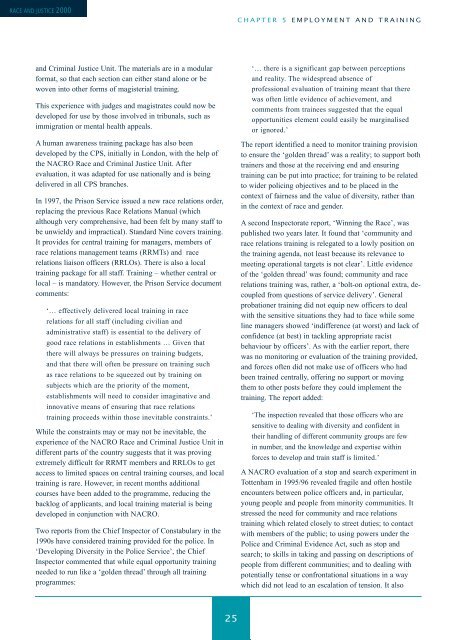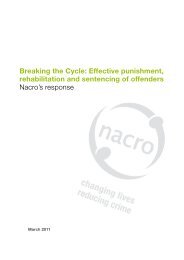Let's get it right: race and justice 2000 - Nacro
Let's get it right: race and justice 2000 - Nacro
Let's get it right: race and justice 2000 - Nacro
- No tags were found...
Create successful ePaper yourself
Turn your PDF publications into a flip-book with our unique Google optimized e-Paper software.
RACE AND JUSTICE <strong>2000</strong>CHAPTER 5 EMPLOYMENT AND TRAINING<strong>and</strong> Criminal Justice Un<strong>it</strong>. The materials are in a modularformat, so that each section can e<strong>it</strong>her st<strong>and</strong> alone or bewoven into other forms of magisterial training.This experience w<strong>it</strong>h judges <strong>and</strong> magistrates could now bedeveloped for use by those involved in tribunals, such asimmigration or mental health appeals.A human awareness training package has also beendeveloped by the CPS, in<strong>it</strong>ially in London, w<strong>it</strong>h the help ofthe NACRO Race <strong>and</strong> Criminal Justice Un<strong>it</strong>. Afterevaluation, <strong>it</strong> was adapted for use nationally <strong>and</strong> is beingdelivered in all CPS branches.In 1997, the Prison Service issued a new <strong>race</strong> relations order,replacing the previous Race Relations Manual (whichalthough very comprehensive, had been felt by many staff tobe unwieldy <strong>and</strong> impractical). St<strong>and</strong>ard Nine covers training.It provides for central training for managers, members of<strong>race</strong> relations management teams (RRMTs) <strong>and</strong> <strong>race</strong>relations liaison officers (RRLOs). There is also a localtraining package for all staff. Training – whether central orlocal – is m<strong>and</strong>atory. However, the Prison Service documentcomments:‘… effectively delivered local training in <strong>race</strong>relations for all staff (including civilian <strong>and</strong>administrative staff) is essential to the delivery ofgood <strong>race</strong> relations in establishments … Given thatthere will always be pressures on training bud<strong>get</strong>s,<strong>and</strong> that there will often be pressure on training suchas <strong>race</strong> relations to be squeezed out by training onsubjects which are the prior<strong>it</strong>y of the moment,establishments will need to consider imaginative <strong>and</strong>innovative means of ensuring that <strong>race</strong> relationstraining proceeds w<strong>it</strong>hin those inev<strong>it</strong>able constraints.’While the constraints may or may not be inev<strong>it</strong>able, theexperience of the NACRO Race <strong>and</strong> Criminal Justice Un<strong>it</strong> indifferent parts of the country suggests that <strong>it</strong> was provingextremely difficult for RRMT members <strong>and</strong> RRLOs to <strong>get</strong>access to lim<strong>it</strong>ed spaces on central training courses, <strong>and</strong> localtraining is rare. However, in recent months add<strong>it</strong>ionalcourses have been added to the programme, reducing thebacklog of applicants, <strong>and</strong> local training material is beingdeveloped in conjunction w<strong>it</strong>h NACRO.Two reports from the Chief Inspector of Constabulary in the1990s have considered training provided for the police. In‘Developing Divers<strong>it</strong>y in the Police Service’, the ChiefInspector commented that while equal opportun<strong>it</strong>y trainingneeded to run like a ‘golden thread’ through all trainingprogrammes:‘… there is a significant gap between perceptions<strong>and</strong> real<strong>it</strong>y. The widespread absence ofprofessional evaluation of training meant that therewas often l<strong>it</strong>tle evidence of achievement, <strong>and</strong>comments from trainees suggested that the equalopportun<strong>it</strong>ies element could easily be marginalisedor ignored.’The report identified a need to mon<strong>it</strong>or training provisionto ensure the ‘golden thread’ was a real<strong>it</strong>y; to support bothtrainers <strong>and</strong> those at the receiving end <strong>and</strong> ensuringtraining can be put into practice; for training to be relatedto wider policing objectives <strong>and</strong> to be placed in thecontext of fairness <strong>and</strong> the value of divers<strong>it</strong>y, rather thanin the context of <strong>race</strong> <strong>and</strong> gender.A second Inspectorate report, ‘Winning the Race’, waspublished two years later. It found that ‘commun<strong>it</strong>y <strong>and</strong><strong>race</strong> relations training is relegated to a lowly pos<strong>it</strong>ion onthe training agenda, not least because <strong>it</strong>s relevance tomeeting operational tar<strong>get</strong>s is not clear’. L<strong>it</strong>tle evidenceof the ‘golden thread’ was found; commun<strong>it</strong>y <strong>and</strong> <strong>race</strong>relations training was, rather, a ‘bolt-on optional extra, decoupledfrom questions of service delivery’. Generalprobationer training did not equip new officers to dealw<strong>it</strong>h the sens<strong>it</strong>ive s<strong>it</strong>uations they had to face while someline managers showed ‘indifference (at worst) <strong>and</strong> lack ofconfidence (at best) in tackling appropriate racistbehaviour by officers’. As w<strong>it</strong>h the earlier report, therewas no mon<strong>it</strong>oring or evaluation of the training provided,<strong>and</strong> forces often did not make use of officers who hadbeen trained centrally, offering no support or movingthem to other posts before they could implement thetraining. The report added:‘The inspection revealed that those officers who aresens<strong>it</strong>ive to dealing w<strong>it</strong>h divers<strong>it</strong>y <strong>and</strong> confident intheir h<strong>and</strong>ling of different commun<strong>it</strong>y groups are fewin number, <strong>and</strong> the knowledge <strong>and</strong> expertise w<strong>it</strong>hinforces to develop <strong>and</strong> train staff is lim<strong>it</strong>ed.’A NACRO evaluation of a stop <strong>and</strong> search experiment inTottenham in 1995/96 revealed fragile <strong>and</strong> often hostileencounters between police officers <strong>and</strong>, in particular,young people <strong>and</strong> people from minor<strong>it</strong>y commun<strong>it</strong>ies. Itstressed the need for commun<strong>it</strong>y <strong>and</strong> <strong>race</strong> relationstraining which related closely to street duties; to contactw<strong>it</strong>h members of the public; to using powers under thePolice <strong>and</strong> Criminal Evidence Act, such as stop <strong>and</strong>search; to skills in taking <strong>and</strong> passing on descriptions ofpeople from different commun<strong>it</strong>ies; <strong>and</strong> to dealing w<strong>it</strong>hpotentially tense or confrontational s<strong>it</strong>uations in a waywhich did not lead to an escalation of tension. It also25

















